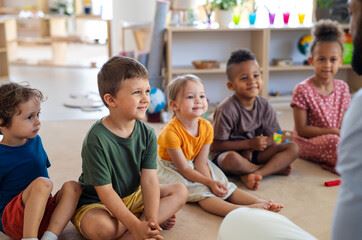
A child’s ability to self-regulate emotions and attention is the foundation for later social and emotional development. Programs that foster these abilities can have beneficial effects on later academic, work, family, social, and civic functioning. Many primary schools already employ social-emotional learning curricula around the globe, but could those curricula be improved by adding a mindfulness-based component?
Haines et al. [Mindfulness] conducted a randomized controlled study to test the effects of a Mindfulness-Based Kindness Curriculum (MBKC) on early childhood social-emotional, executive, and academic functioning.
The researchers randomly assigned 16 pre-school and 4 kindergarten classrooms, comprising 245 children(mean age = 4 years; 77% lower income; 54% male; 42% Caucasian, 24% Hispanic, 13% Black, 12% Asian, 8% mixed ethnicity), to a classroom curriculum-as-usual or the classroom curriculum with the addition of MBKC. Fourteen of the 16 classrooms (including all of the control classrooms) already had established social-emotional learning programs as part of their regular curricula.
The 12-week MBKC program consisted of 24 lessons, each lasting 15-20 minutes, and these lessons taught by the children’s regular classroom teachers, each of whom received 26 hours of training. The MBKC lessons incorporated children’s literature, music, and movement, and they were organized into 8 thematic categories: mindful bodies, inside emotions, emotional expression, emotional caretaking, self-calming, gratitude, caring for others, and caring for the world. The overarching focus of the program was on teaching non-judgmental acceptance, present-moment awareness, and kindness.
To assess the impact of the intervention, students were evaluated 6 weeks before the program's initiation and 4 weeks after its completion. The assessments included a set of social and cognitive tasks, which were scored by blinded raters. Additionally, self-assessments, teacher evaluations, and parent ratings were used to measure social-emotional, academic, and developmental competencies.
The results showed that the MBKC group outperformed controls on a generosity task in which they could keep stickers for themselves or dole them out to various others, including a sick child (partial η2 = .02).
According to teacher reports, the MBKC group was rated as more prosocial (.07) and empathic (.08) and as showing greater social emotional intelligence (.08), cognitive development (.19), physical development (.41), language ability (.10), math ability (.20), and literacy (.43). According to parent reports, the MBKC group showed higher levels of cognitive empathy (.05) and social-emotional functioning (.02).
On many of the measures, children who initially performed poorly on pre-intervention measures benefitted the least from MBKC, while those who initially performed the best on the baseline showed the greatest improvements. For example, when it came to a task measuring the ability to remain undistracted by extraneous cues (known as the Flanker task), children who initially scored the lowest on the pretest benefitted more from the routine curriculum, while those who initially scored the highest on the pretest benefitted more from MBKC (.07).
The study demonstrates that MBKC has the potential to enhance generosity, empathy, and social-emotional functioning in young children, particularly in those who already possess baseline social-emotional and cognitive competencies.
The study suffers some limitations. Ratings provided by teachers and parents who were not blinded to the study group yielded results that were more pronounced than those provided by objective measures that were scored by blind raters. Also, the significant improvements in teacher ratings for children’s physical, language, and math competencies were unexpected.
Reference:
Haines, B. A., Hong, P. Y., Immel, K. R., & Lishner, D. A. (2023). The Mindfulness-Based Kindness Curriculum for Preschoolers: An Applied Multi-Site Randomized Control Trial. Mindfulness.
Link to study